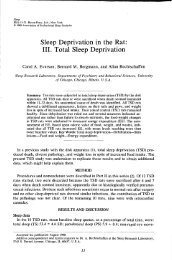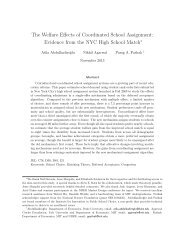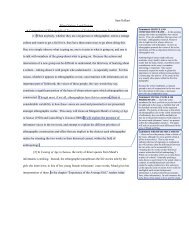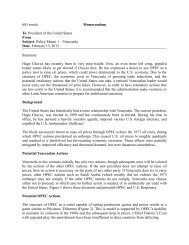mental health- counseling-1.pdf - iSites - Harvard University
mental health- counseling-1.pdf - iSites - Harvard University
mental health- counseling-1.pdf - iSites - Harvard University
Create successful ePaper yourself
Turn your PDF publications into a flip-book with our unique Google optimized e-Paper software.
NASPA Journal, Vol. 41, no. 1, Fall 2003<br />
charging a fee for personal <strong>counseling</strong>, and 39% charge a fee for other<br />
testing and assessment services (Gallagher, Sysko, & Zhang, 2001).<br />
Counseling centers can also implement a variety of innovative strategies<br />
to meet the <strong>mental</strong> <strong>health</strong> needs of students and the demand for<br />
services. In terms of direct clinical services, these strategies may<br />
include offering more immediate and accessible appointments, especially<br />
for students in crisis, by providing phone consultations and<br />
evening and drop-in appointments. Peer counselors and graduate<br />
interns can also be an important resource that allows <strong>counseling</strong> centers<br />
to serve more students. Group therapy and self-help programs<br />
(e.g., books, pamphlets, videos, Internet resources about <strong>mental</strong><br />
<strong>health</strong> issues) are alternatives to individual <strong>counseling</strong> that can be<br />
effective for many students.<br />
Counseling center directors reported using the following strategies to<br />
set limits and manage caseloads more effectively:<br />
• 73% use a brief therapy model that has been demonstrated to be<br />
an “effective and often viable option for many <strong>counseling</strong> center<br />
clients” (Stone & Archer, 1990, p. 600).<br />
• 44% limit the number of individual <strong>counseling</strong> sessions per student.<br />
• 16% assign students to group <strong>counseling</strong> directly after an intake<br />
session.<br />
• 68% see students less than once a week for <strong>counseling</strong>.<br />
• 9% shorten the length of <strong>counseling</strong> sessions.<br />
• 41% refer to off-campus resources.<br />
Ninety percent of centers also reserve the right to deny services to students<br />
whose <strong>mental</strong> <strong>health</strong> needs exceed the center’s treatment<br />
resources (Gallagher, Sysko, & Zhang, 2001).<br />
As the demand for clinical services mounts, <strong>counseling</strong> centers may be<br />
tempted to put all their resources into meeting that need. However,<br />
they should not abandon other important “traditional and preventive<br />
and develop<strong>mental</strong> activities” (Stone & Archer, 1990, p. 547) such as<br />
outreach, consultation, career <strong>counseling</strong>, and personal growth issues.<br />
176

















